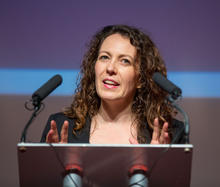 TV Presenter – Engineer – Champion for girls in Science, Technology, Engineering and Mathematics (STEM)
TV Presenter – Engineer – Champion for girls in Science, Technology, Engineering and Mathematics (STEM)
Engineer
Oxford University Physics graduate Kate started out as a trainee audio engineer for the BBC. She completed her training in the early 1990’s – despite already achieving success in front of the camera as a presenter for Tomorrow’s World. In 2003 she was awarded an MSc, studying at the University of Hertfordshire. She is married to broadcast engineer, Martin Young, and they have two teenage children.
TV Presenter
Kate’s presenting skills came to the attention of BBC producers in the early 1990s. She was talent-spotted taking part in a series of engineering lectures for schools. Her success in the BBC Schools series ‘Techno’ led to her being offered a prize job in broadcasting – fronting the weekly live show Tomorrow’s World from 1990 to 1994!Building on her popularity with younger viewers, she went on to host the children’s ITV science programme ‘Big Bang’ and then Radio 5 Live’s ‘The Acid Test’.
In 2010 Kate returned to the BBC to feature as a reporter for the ‘Museum of Life’ – a 6 part documentary series on the amazing work behind the scenes at the Natural History Museum. Kate continues to present programmes and features as a contributor and commentator for news and current affairs.
Champion for girls in Science, Technology, Engineering and Maths (STEM)
While working for the BBC, Kate was appointed President of Young Engineers and continued to promote science and engineering via a network of clubs in schools and colleges. Then, in 2010 Kate was appointed National STEM Careers Coordinator for the Department of Children, Schools and Families. Her focus was to enable all young people to be able to make informed STEM subject and career choices, and her report “Discovering talent, developing skills – Helping STEM employers engage with schools and colleges” created a roadmap for effective employer-education engagement.In recognition of her contribution to promotion of STEM careers in the UK, Kate was awarded the UK Resource Centre for Women in STEM’s prestigious Women of Outstanding Achievement Award in 2011.
Kate continued on her personal mission to promote cross-STEM careers awareness to young people, parents and teachers, while finding new ways for employers to work with education: By 2004 Royal Academy of Engineering had awarded her its medal for the Public Promotion of Engineering. Then, in 2012 the Academy appointed her to work on a new engineering outreach development project, and she was invited to join its Cutting Edge Skills for Further Education Group. During 2014 Kate led STEM Innovation for Gazelle Colleges, combining this with her many speaking appearances and roles on various boards.
Since 2014 Kate has been focusing her huge energy and many talents on her personal goal – to encourage the involvement of girls in Engineering.
Lifelong learner and educator
After gaining an MSc in Electronic Communications Systems with distinction from the University of Hertfordshire in 2003 – with young children of her own – Kate was inspired to take on what she considers her most significant personal challenge; to teach maths in a secondary school. In 2007 she gained Qualified Teacher Status and later stepped in to teach physics to cover illness for 6 months at another local school.
Early education and career history
After attending The Mount School – a Quaker girls’ school in York – Kate got a place at Oxford University to study Physics. After graduating, her first work experience was at BBC Radio Humberside, but her first paid job was a computer programmer with CAP in Cheshire. Kate soon realised she was more interested in audio engineering so moved to London to become a trainee engineer at BBC Broadcasting House, where she met her husband, Martin, also a broadcast engineer.
In 1988 Kate got her first break into the public eye – she was on a BBC-sponsored roadshow to sixth formers – presenting the Institute of Electrical Engineering (IEE) Faraday Lecture ‘Sound and Vision’ when she was talent-spotted for a schools TV series ‘Techno’. Undeterred from her ambition of becoming an engineer she insisted on completing her prestigious BBC training after the run. Then, in 1990, she was invited to audition for the BBC’s flagship live technology show – Tomorrow’s World. Again, she refused to give up studying, eventually gaining her BBC ETSI training during the show’s summer break!
The arts – a personal passion!
It’s no accident that Kate is a natural performer on the podium and live TV – she is an accomplished stage artist and musician. She holds grade 8 in piano, oboe and voice, is a trained opera singer and has been actively involved in stage performance since she was at school. Kate says, “People suggest I am not a ‘typical’ engineer. I believe that we should not be pigeon-holed by our profession, and I am proud to show that through my love of music and theatre.”
